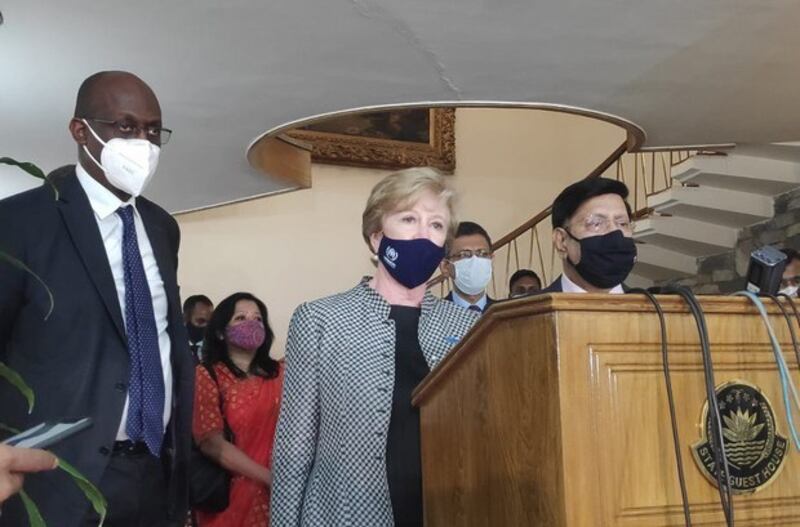After months of negotiation, the United Nations refugee agency will begin humanitarian operations on a remote island where Bangladesh has moved almost 19,000 Rohingya and plans to relocate more than 80,000 others, a senior minister told BenarNews.
The government and UNHCR signed a memorandum last weekend, according to Enamur Rahman, state minister at the Disaster Management Ministry. He did not say when the refugee agency would begin its work on the island.
“The UNHCR has finally agreed to start their operation in Bhashan Char. They will sign an MoU [Memorandum of Understanding] with my ministry on Saturday,” Rahman told BenarNews last Friday.
Bangladesh has built homes on the remote Bay of Bengal island so it can move the refugees there from congested camps in Cox’s Bazar, a mainland southeastern district near the Myanmar border.
BenarNews , an RFA-affiliated online news service, contacted the refugee agency's office in Dhaka and its headquarters in Geneva on Friday, but did not immediately hear back. However, UNHCR confirmed to news agency Agence France-Presse that it was signing the memorandum.
“After the signing of the MoU, the UNHCR will carry out operations in the same way they currently do at Cox’s Bazar camps – the UNHCR will provide food, health and other humanitarian services to the Rohingya in Bhashan Char,” minister Rahman said.
Currently, local NGOs provide food and health services for the Rohingya in Bhashan Char, he said.
The refugees on the island have said they get food free of cost, but the quality and variety is better at Cox’s Bazar. Health care facilities also are better on the mainland.
Rahman said he hoped more Rohingya would want to move to the island from crowded Cox’s Bazar once UNHCR begins its humanitarian work there.
“We have been planning to relocate some 83,000 more Rohingya to Bhashan Char in phases,” he said.
Cox’s Bazar hosts about 1 million Rohingya. The refugees include more than 740,000 who fled Myanmar after the military launched a brutal offensive in August 2017 against the community in their home state of Rakhine.
But the influx of such a large refugee population has strained the economy and host communities in the coastal border district. In addition, the makeshift shanties in the 34 refugee camps on the mainland are fire hazards.
To ease that pressure, and as the refugees’ repatriation prospects got grimmer, Bangladesh built facilities on Bhashan Char – it says it spent $280 million – with the aim of moving 100,000 refugees there.
The first batch of Rohingya moved in December 2020.
Some rights groups have alleged that the Rohingya did not move to the island voluntarily, as the Bangladesh government insisted. Others alleged that the government falsely promised the refugees citizenship if they moved to Bhashan Char.
BenarNews has not been able to substantiate any of these allegations.
Meanwhile, some Rohingya and rights groups have said that since the move, hundreds of refugees have fled the remote island, some at the cost of their lives. In August, 11 Rohingya died and 15 went missing after their boat capsized in bad weather when they tried to escape the island.
Some fled because of poor facilities and others because they had nothing to do there. They claimed tht they were not allowed to leave for the mainland for shopping trips or to meet relatives.

‘Better facilities’
Abdul Kader, a Rohingya leader on the island, said he had moved to Bhashan Char hoping there would be economic opportunities there.
“But there is no source of income here,” Kader told BenarNews by phone on Friday.
Md. Yunuch, a leader of a cluster eight of settlements on Bhashan Char, said he was hopeful about UNHCR starting operations on the island.
“We are happy that the UNHCR will provide us humanitarian services in Bhashan Char. We will get facilities like the camps in Cox’s Bazar, and the trend of fleeing the camps would come down,” Yunuch told BenarNews by telephone on Friday.
“As the UNHCR does not work here, we do not get facilities like the Cox’s Bazar camps,” Yunuch said.
Md. Zbair, secretary of the Arakan Rohingya Society for Peace and Human Rights, said he wanted to wait and see how things would change with the presence of the UNHCR on the island.
“If they get better facilities, more Rohingya would be interested in relocating to Bhashan Char,” he told BenarNews.
For years, international rights and refugee groups, including the U.N., had criticized Bangladesh for planning to move the Rohingya to the island, which they said lacked adequate facilities and was barely habitable.
In part, their criticism stemmed from the U.N. claiming that Bangladesh had, for more than two years, refused several requests for its officials to visit Bhashan Char. The world body wanted to carry out a technical assessment of the island using international experts, it had said.
U.N. officials were finally allowed to visit in March. Their trip was followed by separate visits conducted by the Red Cross and envoys from several countries contributing to the Rohingya response.
Then in June, U.N. officials for the first time endorsed Bangladesh’s decision to relocate the Rohingya to Bhashan Char, but said economic activities should be created for residents of the “isolated” site in the Bay of Bengal.
Munshi Faiz Ahmad, a former chairman of the foreign ministry’s think-tank, the Bangladesh Institute of International and Strategic Studies, said the UNHCR agreeing to work in Bhashan Char would give Rohingya the confidence to move and would benefit those on the mainland as well.
“The housing and other facilities in Bhashan Char are much better than that of Cox’s Bazar. The camps in Cox’s Bazar will be less congested if more Rohingya people relocate to Bhashan Char,” he said.
“Rohingya people were being pushed into illicit drug peddling, internecine violence and other social evils [in Cox’s Bazar]. But in Bhashan Char, they will not face such problems. They would involve themselves in economic activities.”
Reported by BenarNews, an RFA-affiliated online news service.
